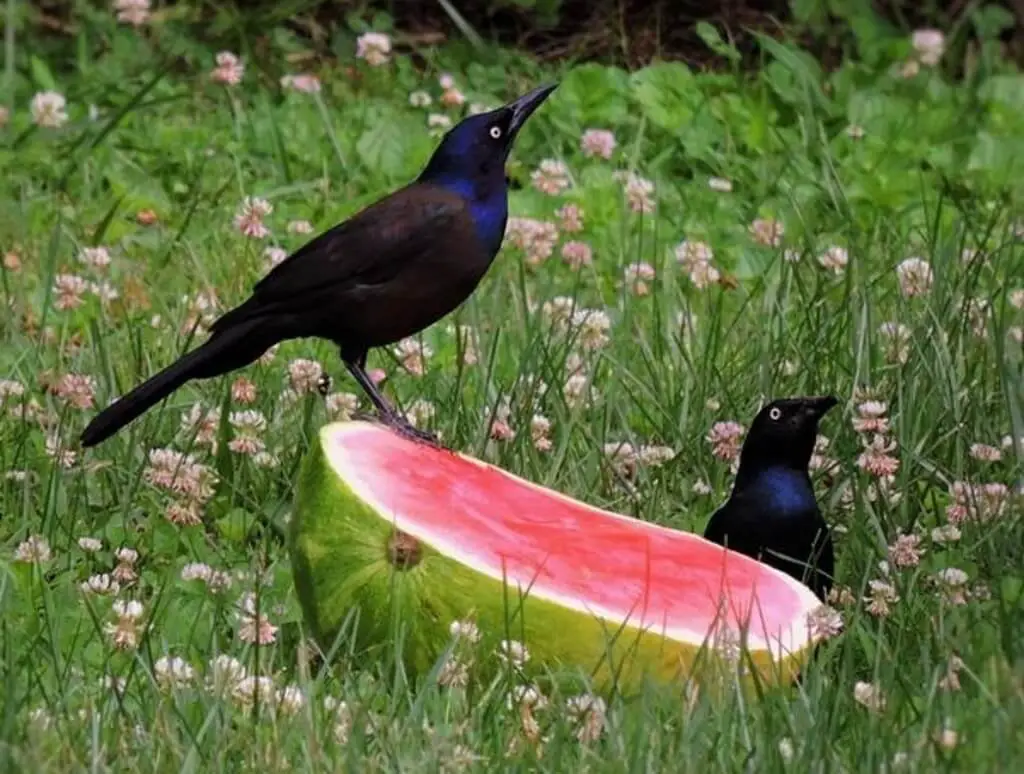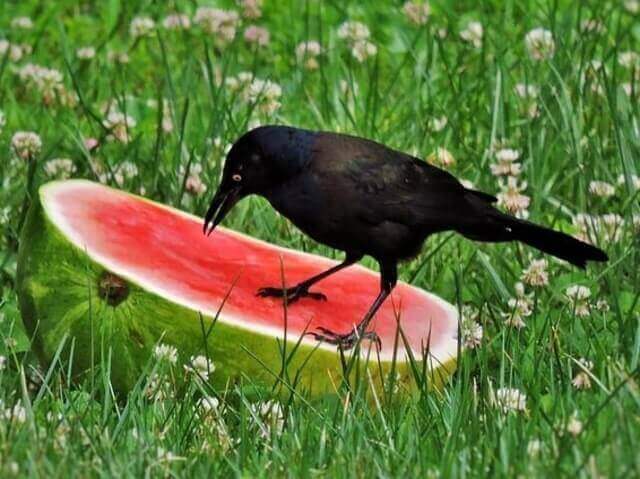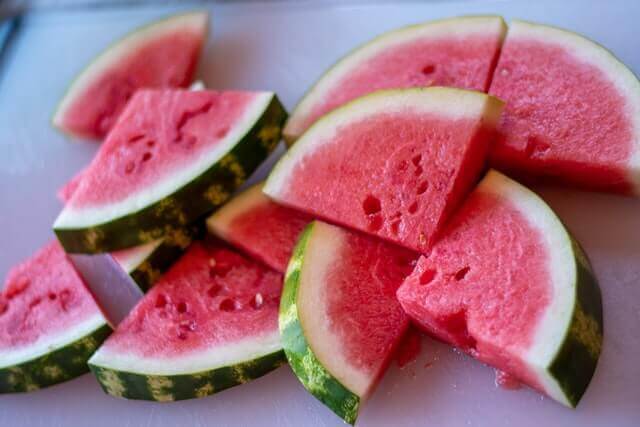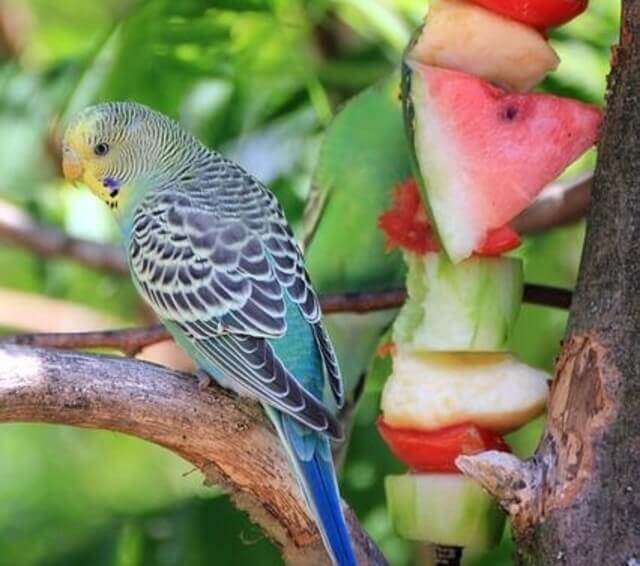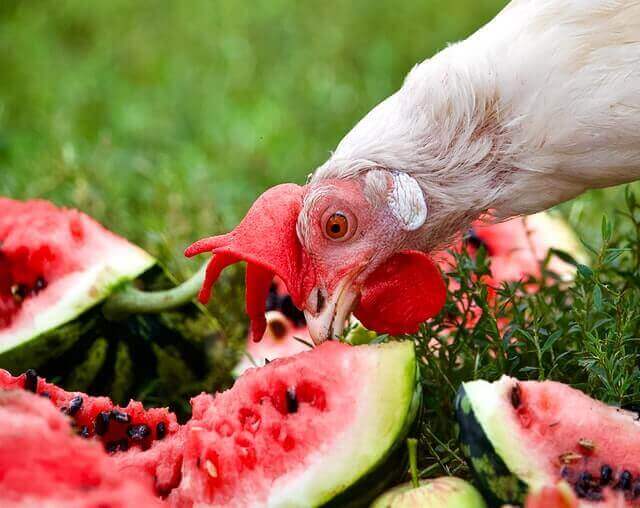As a bird owner, you may want to share your favorite fruits and vegetables with your feathered friend. Watermelon is a popular summer treat for us, but can birds eat it?
In this article, I will explore the safety of feeding watermelon to birds, its nutritional value, and any potential benefits or cautions associated with offering this juicy treat to our avian companions.
Table of Contents
- 1 Key Takeaways:
- 2 Can Birds Eat Watermelon?
- 3 Understanding Bird Diets and Preferences
- 4 Nutritional Value of Watermelon for Birds
- 5 Benefits of Watermelon for Birds
- 6 Safety of Feeding Watermelon to Birds
- 7 Introducing Watermelon to Your Bird’s Diet
- 8 Bird Species That Enjoy Watermelon
- 9 Precautions and Cautionary Notes
- 10 Alternative Fruits for Birds
- 11 Conclusion
- 12 Frequently Asked Questions
- 12.1 Can birds eat watermelon seeds?
- 12.2 Can birds eat watermelon rinds?
- 12.3 What is the nutritional value of watermelon for birds?
- 12.4 Are there any benefits to feeding watermelon to birds?
- 12.5 Is it safe for birds to eat watermelon?
- 12.6 How should I introduce watermelon to my bird’s diet?
- 12.7 Which bird species enjoy watermelon?
- 12.8 Are there any precautions or cautions to keep in mind when feeding watermelon to birds?
- 12.9 Are there alternative fruits that can be fed to birds?
- 13 Author
Key Takeaways:
- Watermelon can be a safe and nutritious treat for many bird species when the seeds are removed.
- It’s important to understand a bird’s dietary needs and preferences before introducing new foods like watermelon.
- Watermelon contains important nutrients like vitamins A and C, as well as minerals essential minerals such as copper, zinc, magnesium, potassium, and folate, which can support feather growth, bone growth, heart health, and metabolism.
- Feeding watermelon to birds may offer benefits like hydration and a source of natural sugars.
- However, it’s essential to introduce watermelon gradually and monitor a bird’s response, and some species may not enjoy watermelon at all.
Can Birds Eat Watermelon?
Watermelon is a hydrating and nutritious treat for birds, offering essential hydration and a quick energy boost. Opt for seedless, fresh, and ripe watermelon to provide this beneficial snack to your feathered friends, especially during hot summer months.
Understanding Bird Diets and Preferences
Before we dive into whether birds can eat watermelon, it’s important to understand their dietary needs and preferences. As a pet owner, you need to consider their natural diets and feeding habits when introducing new foods like watermelon.
Not all bird species have the same dietary requirements. For example, seed-eating birds, like finches, may not need as much fruit in their diet as fruit-eating birds, like parrots.
It’s also crucial to know that a bird’s diet can vary based on their age, gender, and season. For example, breeding pairs may have different feeding requirements than non-breeding pairs.
When it comes to watermelon, it’s important to know that while it is a fruit, it can also be high in sugar. If your bird is diabetic or overweight, it may be best to limit or avoid feeding them watermelon.
Overall, it’s essential to research your bird’s species and their feeding habits before making any changes to their diet. If you’re unsure, consult with your veterinarian or an avian nutritionist for guidance on introducing new foods, including watermelon.
Nutritional Value of Watermelon for Birds
Watermelon is a hydrating fruit that can be a nutritious addition to a bird’s diet. It contains important nutrients like vitamins A and C, as well as minerals like potassium.
Vitamin A is essential for maintaining healthy feathers, skin, and eyesight in birds. It can also support their immune system function and promote growth and development. Vitamin C is an antioxidant that can help protect cells from damage and support tissue health. Potassium is important for maintaining proper fluid balance and supporting muscle and nerve function.
In addition to these nutrients, watermelon is also a good source of hydration for birds. Its high water content can help keep them hydrated and aid in digestion.
Overall, incorporating watermelon into a bird’s diet can provide important nutritional benefits and promote overall health and well-being.
Benefits of Watermelon for Birds
Watermelon can provide several advantages to a bird’s diet. Here are some of the benefits:
- Hydration: Watermelon is mostly water, so it can help keep birds hydrated, especially during hot weather.
- Vitamins: Watermelon contains vitamins A, B, B6, and C, which are essential for a bird’s health.
- Minerals: Watermelon is also a source of copper, zinc, magnesium, potassium, and folate, which helps regulate blood pressure, supports proper muscle, nerve function, feather growth, bone growth, heart health, and metabolism.
- Natural sugars: The natural sugars in watermelon can provide a quick burst of energy, making it a good snack option before or after physical activity.
However, it’s important to keep in mind that watermelon should not be the sole source of nutrition for birds. It should be offered as a treat in moderation alongside a varied and balanced diet.
Safety of Feeding Watermelon to Birds
When introducing any new food to your bird’s diet, it’s important to consider their safety and well-being. While watermelon can be a safe and enjoyable treat for many birds, there are a few precautions to keep in mind.
First of all, make sure to remove all seeds and rind from the watermelon before offering it to your bird. While birds can technically eat watermelon seeds, it is not recommended. Watermelon seeds can pose a choking hazard to birds, so it is best to avoid feeding them to your feathered friends.
Also, the tough outer rind of the watermelon is difficult to digest and may cause digestive issues in birds. Therefore, it is important to provide seedless, ripe watermelon to ensure the safety and well-being of your bird.
Additionally, it’s best to introduce watermelon gradually, monitoring your bird’s response to ensure they don’t experience any adverse reactions. Some birds may have individual dietary restrictions or preferences that make watermelon unsuitable for them.
If your bird has a history of gastrointestinal issues or other health concerns, it’s always best to consult with a veterinarian before introducing new foods like watermelon to their diet.
In general, it’s best to offer watermelon and other fruits as a supplement to your bird’s regular diet rather than as a primary source of nutrition. A balanced diet that includes a variety of fresh fruits, vegetables, and other foods will provide the essential nutrients your bird needs to thrive.
Introducing Watermelon to Your Bird’s Diet
Feeding watermelon to your bird can be a fun and nutritious way to mix up their diet. However, it’s important to take a few precautions when introducing this fruit to their feeding routine. Here are a few tips to help you safely incorporate watermelon into their diet:
- Start small: Depending on the size of your bird, start with a small slice of watermelon. Monitor their response and adjust the amount accordingly.
- Remove the rind and seeds: Ensure the watermelon is seedless and remove the green rind, which can be difficult for birds to digest.
- Offer watermelon as a treat: While watermelon can be a nutritious snack, it should not make up the majority of your bird’s diet. Treat it as a special treat, rather than a staple food.
- Observe your bird: Keep an eye on your bird after offering watermelon, and watch for any signs of digestive upset or allergic reaction. If any problems arise, remove watermelon from their diet and speak with your vet.
Feeding watermelon to birds can be a great way to provide hydration and important nutrients like vitamins A and C. By introducing it gradually and monitoring your bird’s response, you can safely offer this juicy treat as a fun addition to their feeding routine.
Bird Species That Enjoy Watermelon
Not all birds have a taste for watermelon, but many species enjoy this juicy fruit. Some examples of birds that may appreciate the occasional watermelon treat include:
| Bird Species | Notes |
|---|---|
| Lovebirds | These small and colorful birds enjoy a variety of fruits, including watermelon. |
| Parakeets/Budgies | These popular pet birds can benefit from the hydration and nutrients provided by watermelon. |
| Fruit Doves | As the name suggests, these birds have a particular fondness for fruit, including watermelon. |
| Orioles | These vibrant birds are known to enjoy watermelon and other sweet fruits. |
Of course, every bird is unique, and individual preferences may vary. Some birds may be hesitant to try new foods, while others may show a strong preference for watermelon or other fruits. By observing your bird’s behavior and experimenting with different foods, you can determine what works best for their specific needs and tastes.
Precautions and Cautionary Notes
While watermelon can be a tasty and hydrating treat for many birds, it’s important to keep a few precautions in mind before offering it to your feathered friend.
Firstly, it’s important to note that not all bird species may enjoy watermelon. While some birds may eagerly gobble up this juicy fruit, others may not show much interest. It’s essential to observe your bird’s feeding preferences and habits before introducing new foods.
Secondly, it’s crucial to introduce watermelon gradually into your bird’s diet. Starting with small pieces and monitoring their response can help avoid any digestive upsets or reactions. If your bird shows signs of aversion or discomfort, it’s best to stop feeding them watermelon and consult with a veterinarian.
Thirdly, while watermelon is generally safe for birds to eat, there are a few precautions to keep in mind. Seeds should be removed before feeding watermelon to birds, as they can be a choking hazard or cause digestive issues. Additionally, it’s best to avoid offering watermelon that has been treated with pesticides or other chemicals, as these can be harmful to birds.
Fourthly, it’s essential to consider any individual dietary requirements or restrictions your bird may have. Some birds may have specific dietary needs or health issues that could be affected by the introduction of watermelon. Consult with a veterinarian or avian nutrition specialist if you have any concerns or questions.
In summary, while watermelon can be a refreshing and nutritious treat for many birds, it’s important to take precautions and monitor their response when introducing it into their diet. By understanding your bird’s dietary needs and preferences, you can provide them with a varied and balanced diet that includes occasional treats like watermelon.
Alternative Fruits for Birds
If watermelon isn’t a suitable option for your bird, there are still plenty of other fruits that can provide similar nutritional benefits. Some great alternatives to watermelon include:
- Berries: Blueberries, strawberries, raspberries, and blackberries are all packed with antioxidants and can be a delicious treat for birds.
- Mango: This tropical fruit is rich in vitamins A and C, as well as potassium and beta-carotene.
- Apple: Apples are an excellent source of fiber and vitamin C. Just be sure to remove the seeds and core before offering them to your bird.
- Papaya: Papaya is another tropical fruit that’s high in vitamin C, fiber, and beta-carotene.
- Banana: Bananas are a good source of potassium and fiber, but should be offered in moderation due to their high sugar content.
When introducing new fruits to your bird’s diet, it’s important to do so gradually, starting with small portions and monitoring their response. If your bird shows any signs of digestive upset or other negative reactions, it may be best to discontinue the new food and speak with a veterinarian.
Conclusion
After researching the topic of whether birds can eat watermelon, I have determined that it can be a safe and healthy treat for many avian species. Not only does watermelon provide hydration, but it also contains important nutrients like vitamins A, B, B6, and C, as well as minerals like potassium.
However, it’s crucial to introduce watermelon into a bird’s diet gradually and monitor their response. It’s also important to consider their individual dietary needs and restrictions. Some bird species may not have a taste for watermelon, while others may enjoy it as a treat.
If you do choose to offer watermelon to your feathered friend, make sure to take necessary precautions and monitor their behavior for any signs of discomfort or illness. Additionally, if watermelon isn’t suitable for your particular bird, there are other fruits that can provide similar nutritional benefits.
In conclusion, the answer to the question “Can birds eat watermelon?” is yes, but with caution. By understanding their dietary needs and preferences, we can provide our feathered friends with a varied and balanced diet that includes safe and nutritious treats like watermelon.
Remember to Always Consult with a Vet
Before making any significant changes to your bird’s diet, it’s crucial to consult with a vet who specializes in avian care. They can offer personalized recommendations based on your bird’s individual needs and help you ensure that they are receiving a balanced and healthy diet.
Thank you for reading and happy feeding!
Frequently Asked Questions
Can birds eat watermelon seeds?
No, birds should not consume watermelon seeds, even though they can eat them. These seeds can pose a choking hazard to birds and are best avoided. When offering watermelon to birds, it’s essential to provide seedless, ripe fruit to ensure their safety.
Can birds eat watermelon rinds?
Birds can consume small amounts of watermelon rind, but it’s not their preferred part of the fruit. While the fleshy, pink part of the watermelon is a favorite among birds, the rind is less appealing and might be tougher to eat. It’s best to offer birds the juicy, seedless interior of the watermelon for their enjoyment.
What is the nutritional value of watermelon for birds?
Watermelon is a refreshing source of hydration for birds due to its high water content. It primarily contains vitamins A, B, B6, and C, which can benefit their health. Additionally, watermelon provides a quick energy boost primarily from natural sugars, aiding birds during periods of high activity. While it’s not a significant source of essential nutrients, these vitamins can be valuable for birds.
Are there any benefits to feeding watermelon to birds?
Feeding watermelon to birds provides hydration and a boost of energy due to its sugar content. It’s particularly advantageous during hot periods, helping birds stay cool and replenished.
Is it safe for birds to eat watermelon?
Watermelon is generally safe for birds when offered in moderation. Opt for fresh, ripe, seedless varieties to prevent potential choking hazards.
How should I introduce watermelon to my bird’s diet?
Begin by offering small, bite-sized, ripe, and seedless watermelon pieces. Birds might be cautious at first, so patience is essential. Gradually increase the quantity if they show interest.
Which bird species enjoy watermelon?
Watermelon can attract a variety of bird species, especially those with a preference for fruit, including robins, sparrows, and finches.
Are there any precautions or cautions to keep in mind when feeding watermelon to birds?
To avoid choking hazards, ensure the watermelon is seedless. Steer clear of overly ripe or fermented portions. Remember, moderation is essential to prevent excessive sugar intake, which can be detrimental to birds.
Are there alternative fruits that can be fed to birds?
Indeed, a range of fruits like apples, berries, and grapes are excellent choices for birds. Offering a diverse diet with these fruits ensures balanced nutrition for your feathered visitors.

